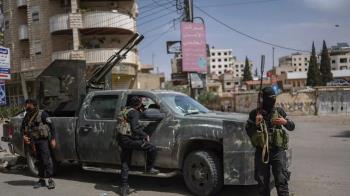Alwaght-The secretary-general of the six-nation Persian Gulf Cooperation Council (GCC), Abdelatif Al Zayani, said Wednesday that GCC oil-rich monarchies would continue to throw their support behind the embattled Yemeni President Abd Rabbuh Mansour Hadi. Al Zayani met Hadi in the presidential palace in Aden. The latter had been residing Aden, ever since he fled amid Ansarullah power in Sanaa.
Recently, Hadi had retracted his resignation he submitted, when Ansarullah took control over Sanaa, and kept him under house arrest for a month.
According to a statement from his office, Hadi told Al Zayani that he called on all state and government institutions to move to Aden.
The Persian Gulf Cooperation Council, composed of Saudi, Kuwait, Qatar, Bahrain, the UAE, and Oman, keep throwing weight supporting Mansour al-Hadi against Yemeni protesters, as they are afraid of the rise of a democratic state in their neighborhood. The six oil-rich Arab monarchies have always had sectarian allegations against the Ansarullah, accusing them of applying an Iranian agenda, as well as increasing its influence in the region.
The same situation is observed in Bahrain. In spring 2011, the Bahraini peaceful and unarmed protestors, against the forty years old Bahraini government, were brutally oppressed by the Bahraini, Saudi, and Qatari troops.
During these four years of the Bahraini revolution against the British-imposed monarchy of Al Khalifah, mosques were destructed, thousands were arbitrary arrested, and hundreds were arrested, including the opposition leaders and human rights activists by Bahraini, Saudi, and Qatari troops. Despite the daily protests in villages and cities, the revolution in Bahrain still receives the least amount of Arabic media coverage. Moreover, the Bahraini regime brutality did not provoke any international concerns, since the governments of the GCC monarchies always claim and scheme that the Islamic Republic instigated the protests against Al-Khalifah monarchy.
These monarchies, as in the case of Ansarullah revolution in Yemen, accuse the Bahraini revolution of being a “Shiite revolution” that aims to spike the Iranian influence in the Persian Gulf.
Ansarullah’s revolution pushed the neighboring Persian Gulf regimes to urge UN Security Council to act forcefully against the takeover. GCC also asked for an urgent meeting of the Arab League and of the Organization of Islamic Cooperation.
However, unlike Bahrain, the revolution in Yemen last January, pushed international powers to act against the legitimate Yemeni forces. Since the Ansarullah took over the government earlier this month, several Western and Arab countries have closed their diplomatic missions in Sanaa. The US Secretary of State accused the Islamic Republic of intervening in Yemen, and the UN Security Council urged the militia to withdraw its forces from government institutions. Even Bam Ki Moon has warned that Yemen is falling apart and said the Western-backed Hadi should be restored to power.
Saudi-led Arab monarchies are taking all measures that will enable them preserve their and their Western-backers' vital interests in Yemen, as well as in the Persian Gulf. The West will continue adopting the same biased approaches towards regional issues, backing Arab-dictatorships against the people’s rights.
Ansarullah stresses that it will not cave out against the threats, and that Yemenis were engaged in a process of self-determination free of any foreign tutelage.
















 Still Backing Hadi.jpg)










